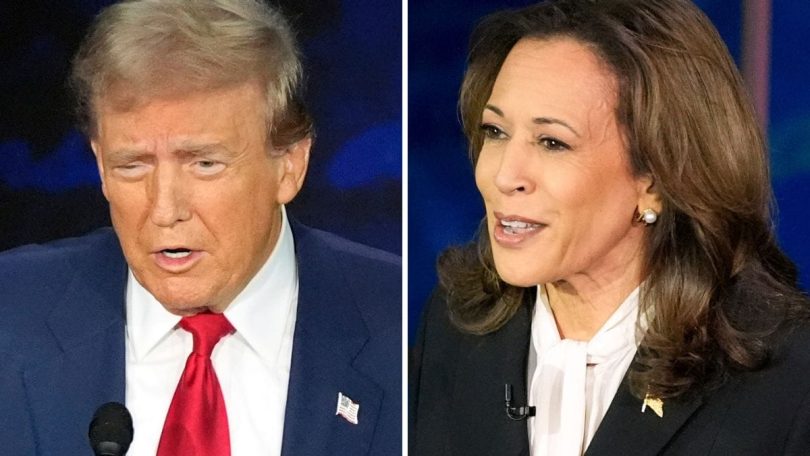According to polls, LGBTQ rights are likely to play a role when Americans pick their new president in November. While Democrat nominee Kamala Harris has made it a ‘legislative priority’ throughout her political career, Republican candidate Donald Trump has restricted queer community’s rights
read more
Polls show that LGBTQ rights will likely factor into most Americans’ pick for president this November as they choose between former Republican President Donald Trump and Vice President Kamala Harris, a Democrat.
A
March 2024 survey by independent pollster PRRI found that 68 per cent of voters will take LGBTQ rights into consideration at the polls. Fully 30 per cent stated that they would vote only for a candidate who shares their views on the issue.
Advertisement
It is no coincidence, then, that LGBTQ rights issues feature prominently in the party platforms.
The Republican Party’s
electoral promises include cutting existing federal funding for gender-affirming care and restricting transgender students’ participation in sports. Meanwhile, the
Democratic Party platform proposes to outlaw discrimination against LGBTQ people, including passing the
Equality Act, which would prohibit discrimination based on sexual orientation and gender identity in housing, health care and public accommodations.
As a legal scholar who has written extensively on
the history of LGBTQ rights, I have seen that the clearest indication of how a politician will act once in office is not what they promise on the campaign trail. Instead, it’s what they have done in the past.
Let’s examine their records.
Trump and LGBTQ rights
Trump and his running mate, US
Senator JD Vance of Ohio, are both relatively new to politics, so their records on LGBTQ rights issues are slim.
Trump enacted two policies restricting LGBTQ rights early in his one term in office. The first was his 2017 executive order
Promoting Free Speech and Religious Liberty, which reinforced that federal law must respect conscience-based objections to comply with the First Amendment. This order indirectly imperiled LGBTQ rights because many LGBTQ rights battles are fought over whether conservative Christian businesses run afoul of anti-discrimination laws
when they refuse to serve same-sex couples.
A few months later, Trump banned transgender individuals from
serving in the US armed forces. He ultimately
revoked the directive, implementing instead
a new policy that allowed existing transgender soldiers to remain in the military but barred new transgender recruits from enlisting.
Vance against trans rights
Vance, a one-term senator, has accrued a record of trying to roll back the rights of transgender Americans during his short time in public office.
Advertisement
Between 2023 and 2024, Vance introduced or sponsored five bills opposing trans rights. One seeks to restrict gender-affirming care for minors by imposing
criminal sanctions on doctors who perform such surgeries; another aims to do the same by exposing physicians to
civil liability for either prescribing gender-affirming hormones or performing surgeries.
Another Vance bill would expand healthcare workers’ ability to make
conscience-based objections to transgender rights. One more would amend Title IX, which prohibits discrimination based on sex in education, to
limit transgender student participation in athletics.
Vance has also tried to pass legislation that would stop the Department of State
from issuing passports with an unspecified “X” gender designation, a policy that launched in 2021.
Gender-neutral passports allow transgender, intersex and nonbinary individuals to carry identity documents that reflect their gender identity and avoid
what can be significant problems getting through airport security with misgendered IDs.
Advertisement
Congress has not voted on any of these proposals.
Harris’ ’legislative priority’
Harris and her vice presidential pick, Minnesota Governor Tim Walz, have both made LGBTQ rights a legislative priority throughout their long political careers.
Harris initially took public office in 2003 as San Francisco’s district attorney. In that role, she established a hate crimes unit that prosecuted
violence against LGBTQ youth in schools. She also trained prosecutors nationwide to counter the
“gay panic” and “trans panic” defences in court, which is when lawyers
attempt to justify violence as a fear-based reaction to the victim’s sexual orientation or gender identity.
Harris was elected California’s attorney general in 2011 and
declined to defend the state’s ban on same-sex marriage when opponents challenged the law’s constitutionality before the US Supreme Court. She also
joined amicus briefs supporting transgender bathroom access after North Carolina barred transgender people from using bathrooms that did not match the gender on their ID.
Advertisement
US Vice President Kamala Harris and her husband Doug Emhoff wave as they participate in an LGBTQ + Pride event in Washington, US, June 12, 2021. File Photo/Reuters
Harris, however, did not unequivocally champion LGBTQ rights. In 2015, she
opposed two prisoners’ request for urgent gender-confirmation surgery. She has since called for a “
better understanding” of transgender health needs.
As a US senator from 2017 to 2021, Harris sponsored bills proposing to better address distinct LGBTQ issues
in health care and
the criminal justice system. She also sponsored five Senate bills to prohibit discrimination based on
sexual orientation and gender identity in employment,
housing and
public accommodations. Other bills she sponsored focused on LGBTQ youth, aiming to
prohibit discrimination in child welfare programmes and barring federal funds from supporting so-called
conversion therapy of LGBTQ teens.
The Senate did not vote on any of these bills.
Advertisement
As vice president, Harris has been part of what advocates describe as
the most pro-LGBTQ administration in US history.
Since 2021, President Joe Biden has issued multiple executive orders to
combat discrimination against the LGBTQ community, including by eliminating the Trump-era restrictions on transgender military service. Biden also signed into law the
Respect for Marriage Act, which changed the federal definition of marriage from “a man and a woman” to “two individuals.” The statute ensures that the federal government would continue to recognise same-sex unions if the Supreme Court ever
reversed its decision to legalise marriage equality.
Walz is an ally
Harris’ vice-presidential pick has a similarly extensive record backing LGBTQ rights.
As a US representative from 2007 to 2019, Walz supported efforts to
grant federal benefits to same-sex couples before marriage equality became federal law. He also co-sponsored many of the House versions of the same bills as Harris.
As Minnesota’s governor, Walz has
issued several executive orders promoting LGBTQ inclusion and equity and
banned conversion therapy for minors. He also
declared Minnesota as a “trans refuge state” that will not enforce laws interfering with children’s access to gender-affirming care.
Harris vs Trump
If elected, Trump has promised to cut federal funds for public schools that “
push … gender ideology” and “
keep men out of women’s sports.” Harris pledges to “
defend the freedom to love who you love openly and with pride.”
As citizens head to the polls in November, they can be confident that, on this topic at least, the candidates mean what they say.
This article is republished from
The Conversation under a Creative Commons license. Read the
original article.







